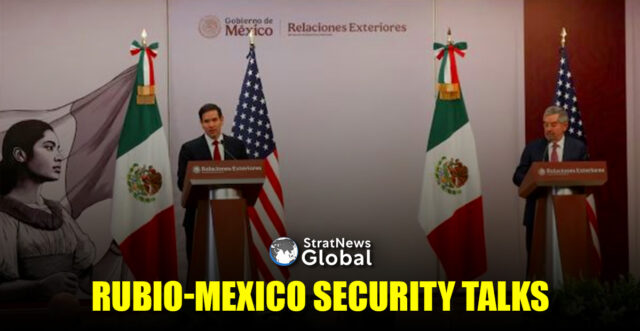During his visit to Mexico on Wednesday, U.S. Secretary of State Marco Rubio said cooperation on security matters between the two nations was stronger than ever. The trip came as the Trump administration pressed ahead with its broad campaign against illegal immigration and drug cartels.
The two countries vowed to work together against organized crime groups, several of which U.S. President Donald Trump’s administration has designated as foreign terrorist organizations, though Mexico reiterated that all operations must respect its sovereignty.
Rubio met with President Claudia Sheinbaum and members of her cabinet to discuss security and praised Mexico’s work.
“It is the closest security cooperation we have ever had, maybe with any country, but certainly in the history of U.S.-Mexico relations,” Rubio told reporters alongside his Mexican counterpart, Juan Ramon de la Fuente, who touted “undeniable results” on migration and security cooperation between the Sheinbaum and Trump administrations.
The visit was overshadowed, however, by the U.S. military strike on a vessel from Venezuela in the Caribbean on Tuesday, which U.S. officials said was carrying illegal drugs.
Rubio said such strikes “will happen again” as Trump wages “war on narco terrorist organizations.”
De la Fuente, when asked about Mexico’s position on the strike, stressed his country’s commitment to non-intervention and the respect of sovereignty without criticizing the attack outright.
A joint statement on Mexican-U.S. security emphasized “respect for sovereignty and territorial integrity,” but the Trump administration has repeatedly said unilateral action against the Mexican cartels remains a possibility.
De la Fuente, in the press conference alongside Rubio, said each country must operate “in their own territory.”
Onward To Ecuador
Washington’s top diplomat will travel from Mexico City to Ecuador in his latest trip to the region.
Rubio, the first Latino U.S. secretary of state, traveled to countries in Central America and the Caribbean during his first overseas trip after taking office as the administration sought to shift back focus to Latin America.
The visit comes as Trump has also intensified his campaign to deport migrants in the U.S. illegally, sending federal agents into major U.S. cities and pushing for high daily arrest quotas.
The crackdown on illegal immigration has drawn criticism from some Latin American leaders, including Sheinbaum, who has condemned recent immigration raids in the United States.
Despite Rubio’s warm words and the good ties maintained by Sheinbaum, analysts say the U.S. administration’s trade policies and efforts to combat drug cartels have disrupted the relationship between the two neighbours.
“The relationship is not in its best situation right now,” said Martha Barcena Coqui, who served as Mexico’s ambassador to the United States and is now an expert with Washington’s Center for Strategic and International Studies think tank.
The U.S. military has also ramped up airborne surveillance of Mexican drug cartels, and Trump has authorized the Pentagon to begin using military force against the groups.
U.S. – Mexico Security Agreement
Sheinbaum has said the U.S. and Mexico are nearing a security agreement to expand cooperation in fighting them, but the statement on Wednesday was thin on detail.
Rubio would not address what the security partnership might mean for tariffs imposed on Mexico, saying it was not part of his portfolio.
Mexico in July was able to avoid 30% tariffs on its goods shipments to the U.S., securing a 90-day pause to work on a trade deal with the Trump administration.
But it is still subject to the previously imposed 25% fentanyl tariffs, though goods sent under the USMCA trade agreement – which are most of them – are exempt.
(With inputs from Reuters)





